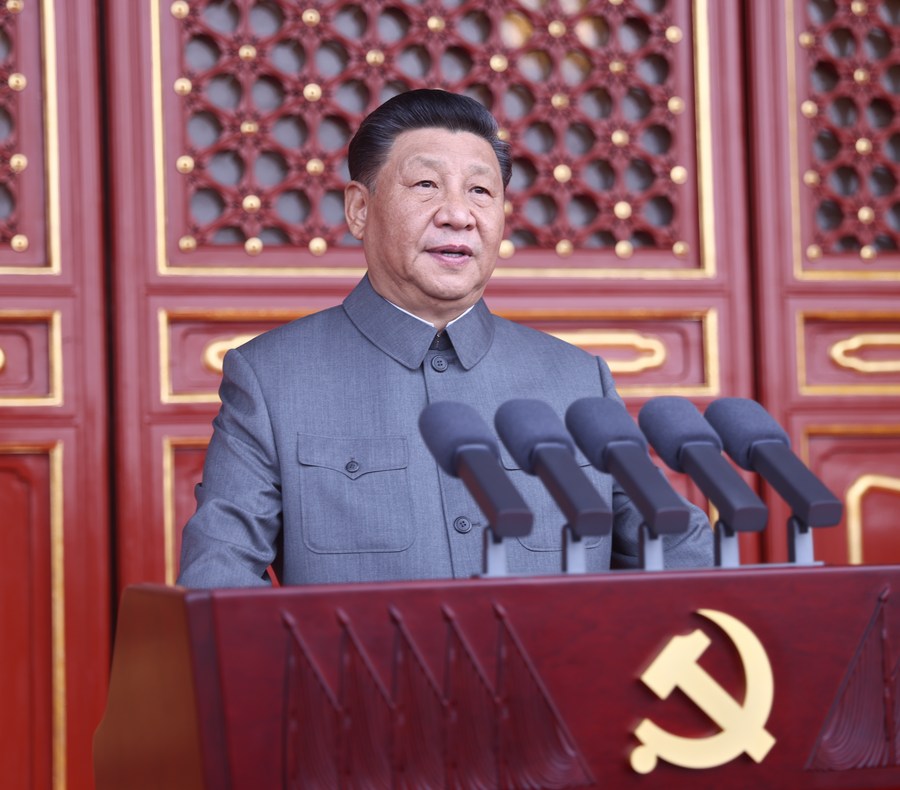Will China invade Taiwan to realize what the Chinese President Xi Jinping says “the Chinese Dream”?
This question, discussed in the strategic circles regularly over the last two years, has gained more currency and led to more global headlines, with Xi making it clear in his July 1 speech at the centenary celebrations of the Chinese Communist Party that “reunification” with Taiwan is one of his top priorities.
“Resolving the Taiwan question and realizing China’s complete reunification is a historic mission and an unshakeable commitment” of the party, Xi said, adding, “It is also a shared aspiration of all the sons and daughters of the Chinese nation.”

What is equally noteworthy that a Chinese magazine, Naval and Merchant Ships, marked the ruling Communist Party’s centenary by publishing a detailed outline of “a three-stage surprise attack” which could pave the way for an assault landing on Taiwan.
Growing Aerial Incursions
And all this is now viewed by the political and strategic elites in major parts of the world, particularly in the Indo-Pacific, along with the rising military activities by China in and around the strait separating Taiwan from mainland China — 81 miles wide at its narrowest.
According to Taiwan’s Defense Ministry, China has conducted over 170 aerial incursions into the island’s air defense identification zone since September-October last year.
Why China’s Military-Linked Firm Is Storing Genetic Data Of Tibetan And Uyghur Women?
And what is more, in April this year, China sent 25 fighters and bombers into Taiwan’s ADIZ. On June 15, it sent 28 aircraft, including 24 offensive aircraft, some of which flew well beyond their normal paths near Taiwan’s south-eastern coast, making it the largest incursion so far.
Besides, as a part of what is called “gray-zone warfare”, China is indulging in accelerated disinformation campaigns designed to intimidate or demoralize Taiwan’s society and undermine popular support for the government in Taipei.

However, what is viewed as more worrisome is that unlike in the past, several retired Chinese military officers are arguing in state-run news outlets and popular websites that with China becoming a great military power (with anti-ship ballistic missiles, attack submarines, and an array of air and naval platforms for conducting saturation attacks to overwhelm enemies, all supported by space-based systems that make it more integrated and lethal), it should not wait anymore for taking control over Taiwan and thus resolve the Taiwan issue once and for all.
The state-run Global Times carried recently an opinion poll that said that 70 percent of those polled strongly supported using force to unify Taiwan with the mainland, and 37 percent thought it would be best if the war occurred in three to five years.
US Says War Threats Are Real
Even Admiral Philip Davidson, the then head of US’s Indo-Pacific Command, testified before the US Senate Armed Services Committee in early March that China “could invade Taiwan” and that “the threat is manifest during this decade, in fact in the next six years.”
Though his successor, Admiral John Aquilino (he took over as head of Indo-Pacific Command on April 30), has not endorsed his predecessor’s timeline of six years, he, nonetheless admits that the prospect of Chinese use of force over Taiwan is “much closer to us than most think”.
Indian Air Force Shows Its Prowess With ‘Swarm Drone Technology’; Tweets Images: Watch
Simulated combats conducted by the Pentagon and the RAND Corporation recently have shown that a military clash between the United States and China over Taiwan would likely result in a US defeat, according to David Ochmanek, a former senior Defense Department official who helps run war games for the Pentagon at the RAND Corporation, a think tank.
#TAIWAN??: big, bold & brassy! The country's redesigned passport is a bona fide thing of beauty & packs a powerful punch. It moved up to 31st worldwide in the 2021 Q3 Henley Passport Index, affording proud holders visa-free access to 146 destinations.
▶️https://t.co/gBdEgazspn pic.twitter.com/KoXrcZf4Kw— 外交部 Ministry of Foreign Affairs, ROC (Taiwan) ?? (@MOFA_Taiwan) July 9, 2021
This, perhaps, explains why in his very first summit meeting with the visiting Japanese Prime Minister Suga Yoshihide on April 16, US President Joe Biden talked of Taiwan, which found a mention in their joint communiqué.
Similarly, the statement released after Biden’s summit with South Korean President Moon Jae-on may 21 emphasized the “importance of preserving peace and stability in the Taiwan Strait.”
Biden also ensured during his first major foreign trip as US President to London to participate in the G-7 meet (June 11-13) that the joint communiqué expressed concern about Taiwan for the first time in the grouping’s history.
It said: “We reiterate the importance of maintaining a free and open Indo Pacific, which is inclusive and based on the rule of law. We underscore the importance of peace and stability across the Taiwan Strait, and encourage the peaceful resolution of cross-Strait issues. We remain seriously concerned about the situation in the East and South China Seas and strongly oppose any unilateral attempts to change the status quo and increase tensions” [emphasis added].
Besides, it is being realized that it is not simply a question of preserving Taiwan’s democracy that the major democracies of the world are worried about. Democracy is important, but it is equally vital to preserve the island’s semiconductor industry to global supply chains from China’s control.
Global IT Industry Banks On Taiwan
The island’s TMSC, the world’s most valuable chipmaker, etches 84% of the most advanced chips. If production at TSMC stops because of Chinese aggression, the global electronics industry will reach a standstill, at incalculable cost.
The firm’s technology and know-how are perhaps a decade ahead of its rivals’ and it will take many years of work before either the US or any other country, including China, catches up.
The global attention to Taiwan is having effects on major countries in the Indo-Pacific. On July 8, Japan declared that it would join the US in defending Taiwan against the “existential threat” of Chinese invasion.
Japanese Deputy Prime Minister Taro Aso said that “if a major problem occurred in Taiwan”, his country would “need to consider seriously” that the neighboring Japanese island of Okinawa “could be next” in Beijing’s list of targets.

In fact, the Japanese pledge to back Taiwan in the event of Chinese aggression is all the more significant, given the fact that doing so will clearly signal a shift in the Japanese military policy, which at the moment forbids the country from making or participating in any war as per its “pacifist” constitution.
If China invades, the American people will also rally around the besieged democracy, according to a recent survey by the Center for Strategic and International Studies.
With a mean score of 6.69 out of 10, respondents from among the US public gave stronger backing for defending Taiwan than Australia (6.38) and comparable to Japan (6.88) and South Korea (6.92).
Similarly, a recent survey by the Chicago Council has found that 59% of Americans believed East Asian security alliances benefit either mostly the US or both the US and allies equally.
A striking 41% of Americans expressed their support for military action to defend Taiwan from Chinese invasion, with this number ballooning to 85% when asked about willingness to defend a US ally militarily in general.
Invading Taiwan Is A Bad Idea
It has also been seen that Taiwan enjoys bipartisan support in the US. A Congressional study shows that there are 94 different bills, measures, or resolutions supporting Taiwan.
Taiwan is also finding increasing support from Indians and Australians, who have recently felt bullied by Beijing. If India has already seen military aggression by China in Ladakh, more than four in 10 Australians are worried that China may attack Australia, according to a new poll.
Viewed differently, such growing international concerns against China may restrain Xi Jinping from undertaking misadventures against Taiwan. Most Western analysts believe that Xi’s goal of establishing China as a rejuvenated economic powerhouse will be badly affected once China’s international standing is damaged over the possible use of military force against Taiwan.

In other words, the economic costs of a military campaign against Taiwan would be so high that China would be left completely isolated internationally, so runs their argument.
In this context, it is pointed out how eight of China’s top ten trading partners are democracies, and nearly 60 percent of China’s exports go to the United States and its allies. “If these countries responded to a Chinese assault on Taiwan by severing trade ties with China, the economic costs could threaten the developmental components of Xi’s rejuvenation plan”, it is argued. There will be a global call for a boycott of all China-made goods.
All told, since 1979, when the US “recognized” Communist China, there was a compromise between the two that Beijing would not forcibly take over Taipei and that it “would preserve the possibility of political unification at some undefined point in the future”. Implied in this formulation was that China would live with the status quo—a de facto, but not de jure, independent Taiwan.
Will Xi break that compromise, which, in turn, would prove too costly both militarily and economically? Unlikely, say analysts like Stephen J. Hartnett.
“Invading Taiwan would show that China has become — like Britain, France, America, Japan, and Russia before it — just another power-hungry and ethics-free monster, grabbing what it wants by crushing the rights and lives of others. This would mark the evolution of China from being a post-colonial nation into an imperial one”, he argues.
And he seems to have a point, since, notwithstanding all the hypes, Xi or any other Chinese official has not publicly declared as yet a timeline for unification with Taiwan. What, however, may continue is China’s gray zone operations.
But that gives time to Taiwan to strengthen its security cooperation with a willing US, the ultimate guarantor of its freedom.




